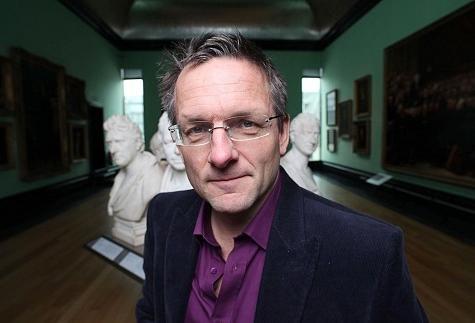Dr Michael Mosley has been involved in some pretty hair-raising stunts in the course of filming various biology strands for the BBC. So, I imagine he might have felt something like relief filming his new series Inside the Human Body. With neither potholing nor bungee jumping, nor tearing down a steep hill in a giant, transparent ball in the offing, the only terrifying thing the engaging presenter was required to do, at least for this opening episode of a four-parter, was to hold an hour-old baby. This was a lovely, tender moment in a film that told the story of human conception and development, and in which the presenter, for once, took a back seat and let the CGI wizardry do most of the talking.
And the visuals were impressive. For the first time we saw the development of a human face in utero. And it was both a bit scary and incredibly, magnificently thrilling. We evolved from fish, Mosley reminded us, which was the only bit of Darwinian evolution we were getting, since this was a programme concerned with the intimate here and now, and the you and us. And so our features were compared to the gilly bits of fish; and we saw a tiny face being formed and slotted neatly together in the middle, leaving the indentation of the philtrum. The tiny hour-long window in which this last stage occurs, at around 10 weeks gestation, leaves much room for error, hence around one in 700 babies are born with a cleft.
But what we were mostly concerned with was the hazardous journey of the millions of sperm that enter the dangerous highways and byways of the female reproductive system. And, bar one lucky victor, she really takes no prisoners.
And, yes, there were loads of facts and stats to grapple with, but all told in the gentlest way possible, and here are just a few that stuck: of the 250 million sperm produced in an average ejaculation - oh, enough to populate the UK, France, Germany and most of Spain - as few as 20 make it as far as the fallopian tubes. But in any case, most of the sperm are duds to begin with. That’s 85 per cent that are either "lifeless, lazy or directionless". It all got a bit anthropomorphic, but it rammed the point home rather effectively. What’s more, the female’s white blood cells are on the attack once sperm enter the cervix, and, with its killer instincts, the female body is primed to accept only the healthiest candidate.
 But, to cut a marvellously epic story short, even after a successful coupling between egg and sperm, a sobering 70 per cent of embryos fail within six days, before most women know they’ve conceived.
But, to cut a marvellously epic story short, even after a successful coupling between egg and sperm, a sobering 70 per cent of embryos fail within six days, before most women know they’ve conceived.So, there were lots of pause-for-thought moments, told with clarity and with just the right amount of awe, but thankfully without the accompaniment of a lot of cod-religiosity about the miracle of life. So top marks for tone and all the sciency bits. And Mosley really is a very winning and warm presenter - a natural with live babies (pictured right), I have to say.
Which leads us to all the human-interest stuff, which took us from Rwanda to the US to somewhere up north. We met a woman pregnant with non-identical triplets and saw some pretty nifty 4D scans of them in their separate sacs, plus a woman pregnant with just one, but who’d spent most of the last 20 years of her life in that state - with 16 pregancies and 15 live births to date, that’s 12 years back to back, and she wasn't planning to stop there. And then we met the oldest surviving conjoined twins, at which point, when my curiosity was really piqued, the programme decided to be coy. The 59-year-old twins shared a penis and a rectum - and whose curiosity wouldn’t be piqued at that snippet of information?
So I wondered whether this rather tantalising approach had the overall effect of cheapening the product, because, really, we didn’t need so much of the extremities of human circumstance to glory in the complex drama of creation. The concentrated tale of conception was enough: great telly, wondrous stats, beautiful biology.
- Watch Inside the Human Body on BBC iPlayer
 Find Inside the Human Body on Amazon
Find Inside the Human Body on Amazon















Add comment